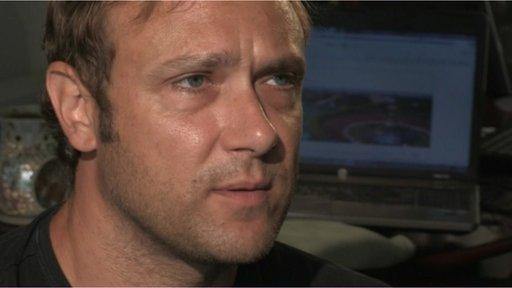Bookmakers' fury at 'flawed' gambling report by MPs
- Published
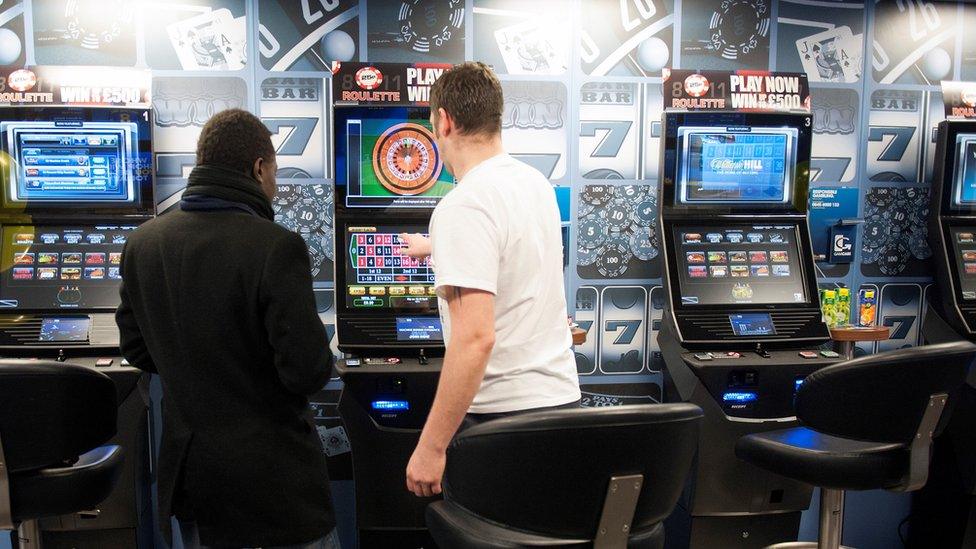
The bookmakers' trade body has reacted angrily to a report by MPs on fixed-odd betting terminals (FOBTs).
The Association of British Bookmakers said it was "deeply flawed" and called for an inquiry by the Parliamentary Commissioner for Standards.
The MPs are recommending that the maximum stake for gambling on the electronic terminals in a bookmakers shop is cut to just £2.
Currently the maximum stake on the electronic terminals is £100.
The renewed call for a lower limit comes from the all-party parliamentary group on FOBTs which published its initial report last December.
The machines have been called the crack cocaine of gambling, but bookmaking firms refused to take part in the MPs' inquiry.
"We were disappointed that the bookmakers declined to participate and fear this is a reflection of their denial of the problems associated with FOBTs and a reluctance on their part to speak to policy makers about appropriate regulation," said the MPs' final report.
'Beginning of the end'
But that accusation prompted a furious reaction from the bookies.
They said the parliamentary group had no proper standing; that its report merely reflected the views of certain MPs with an axe to grind; and that the report had been funded by rivals in the gambling industry, such as those in the casino, arcade and pub industries.
"We strongly believe that the Parliamentary Commissioner for Standards should urgently investigate this all-party parliamentary group," said Malcolm George, chief executive of the Association of British Bookmakers.
"This group of MPs has operated in secrecy, provided no transcripts of the evidence given to their meetings and operated throughout behind closed doors away from public scrutiny."
He added that betting shops were already closing at the rate of more than 100 a year and if the findings of this report were implemented, it "could spell the beginning of the end for the High Street bookmaker".
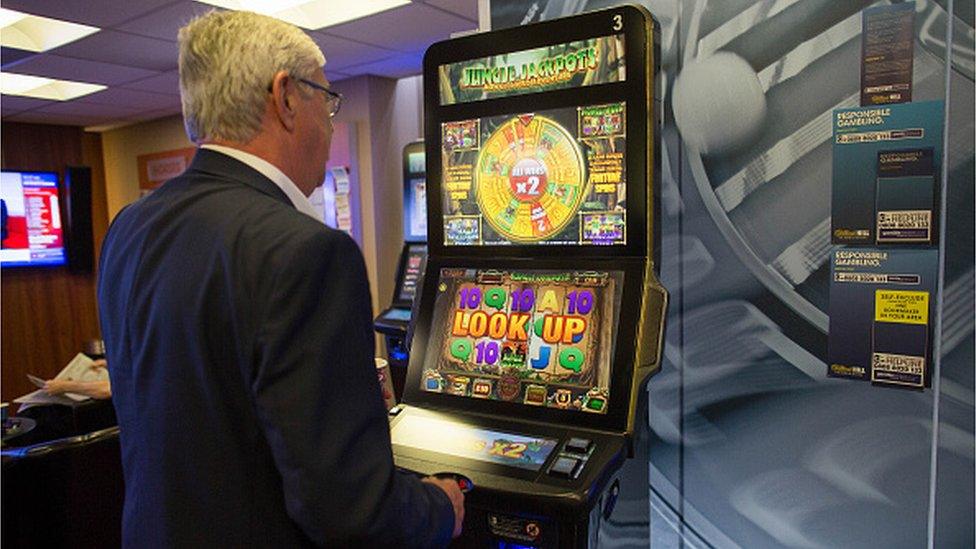

Fixed odds betting terminals
Also known as FOBTs or B2 Gaming Machines
There are 34,809 touch screen electronic gaming machines in 8,709 betting shops across the United Kingdom
Customers can play casino games such as roulette, poker and Black Jack, and electronic slot games and virtual racing
Maximum stake is £100, although an account is required for punters who want to gamble more than £50 in a single play
Maximum prize money is £500
Account for more than 50% of bookmakers' profits
The machines took an average of £48,724

The MPs in their report said they had in fact given the bookmaking firms plenty of opportunity to submit evidence.
Despite the bookies' aggressive opposition, Carolyn Harris MP, chairwoman of the parliamentary group, said the time for prevaricating was over and the government should now take action.
"There is now a clear case for the government to substantially reduce the maximum stake which can be played on FOBTs," she said.
"These machines are easily accessed in the most deprived areas, sucking money out of the pockets of families.
"I support a responsible gambling industry, but there is nothing responsible about how FOBTs are currently being operated," she added.
The 35,000 machines, usually offering roulette, have become the biggest source of money for the bookmaking industry and now provide more than half its profits.
The report cited figures showing that in 2015 £1.7bn was lost by gamblers on the terminals, each of which took £48,724 from punters that year.
'Our pleas ignored'
The industry's enthusiasm for the machines has seen it accused of spreading gambling addiction in some of the poorest parts of the country, especially where there are unusually high concentrations of bookies shops in local High Streets.
The Local Government Association (LGA) has been campaigning against the gambling machines, and its spokesman Simon Blackburn supported the report's call for urgent action.
"With rates of problem gambling higher among those who live near clusters of bookmakers, it is essential that, as the report also recommends, councils are given powers to stop further clusters of betting shops on our high streets," he said.
"A new cumulative impact test - which the LGA has previously called for and which government has introduced through the Police and Crime Act for alcohol licensing - would give them the power to veto new shops in areas already saturated by betting shops."
The report was also supported by Sir Robin Wales, Mayor of Newham council in east London.
"The gambling industry has consistently ignored our pleas to stop blighting our high streets with the clustering of betting shops, which bring anti-social behaviour and crime to the heart of our communities," he said.
The MPs repeated their previous call for the spin speeds of the electronic gambling machines to be reduced to slow down the speed of repetitive betting.
And they also said that the number of betting terminals in each shop should be cut from the current limit of four.
The MPs also took a swipe at the Gambling Commission, which regulates most betting in Great Britain, saying it had been slow off the mark and had failed to do its job properly.
[We] urge the Gambling Commission to take an active role in advising the government to fully regulate FOBTs and to look into accusations of any malpractice by bookmakers or gambling premises more widely," the MPs said.
Allen Kelly, of freebets,com, said: "We are an online betting outlet and of course we would encourage people to take a look at online gambling as an alternative way to place bets, but our industry is highly regulated and seems unfair that betting shops should be dictated to like this in what appears to be a very dubious report.
"This is not a big brother state, gamblers should be able to make their own decisions about how much they want to bet."
- Published8 December 2016

- Published24 October 2016
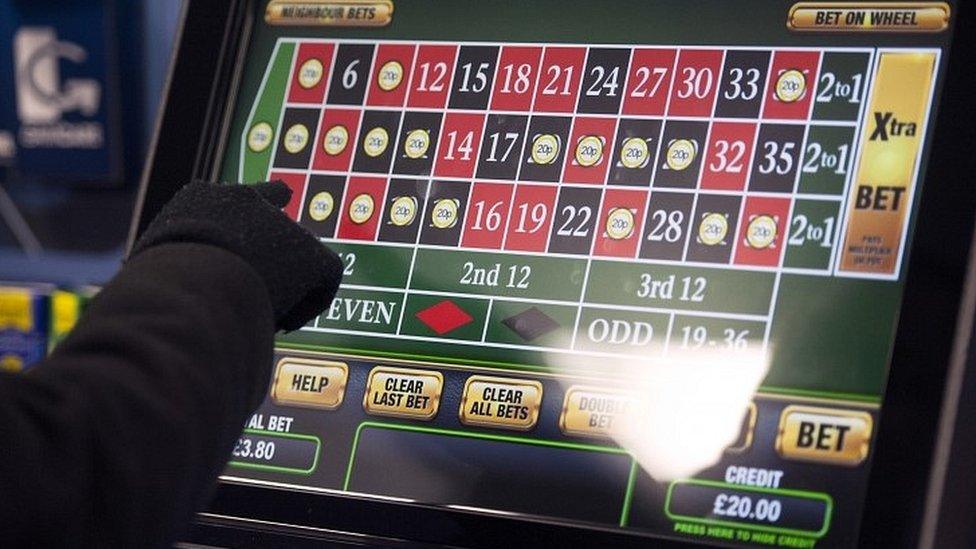
- Published13 June 2016
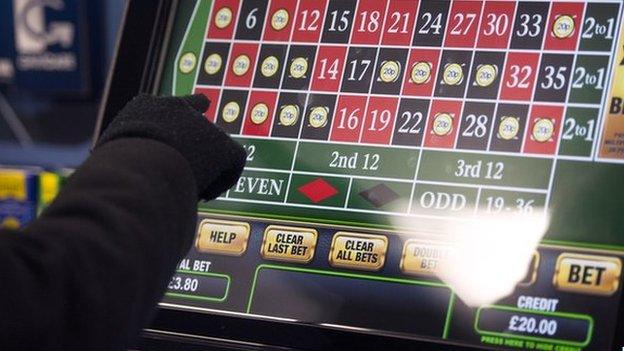
- Published30 September 2013
